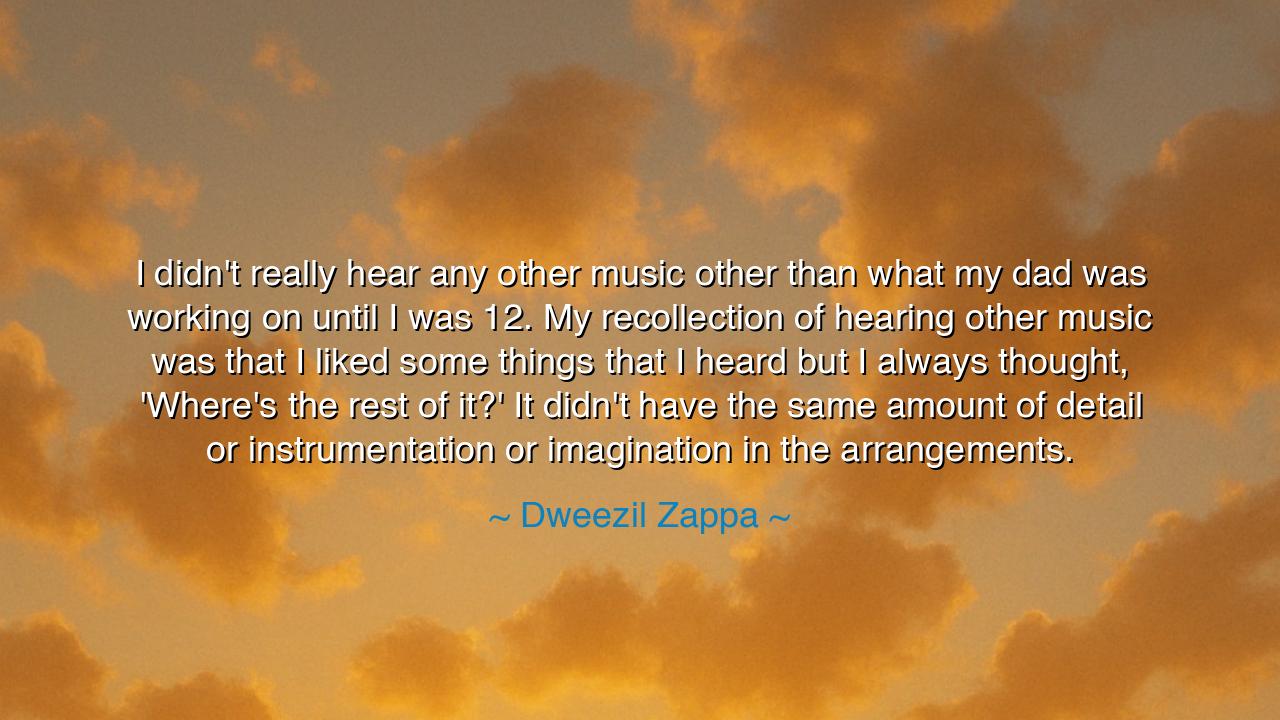
I didn't really hear any other music other than what my dad was
I didn't really hear any other music other than what my dad was working on until I was 12. My recollection of hearing other music was that I liked some things that I heard but I always thought, 'Where's the rest of it?' It didn't have the same amount of detail or instrumentation or imagination in the arrangements.






Listen, O seekers of wisdom, for the words of Dweezil Zappa carry with them a profound reflection on the nature of creativity, exposure, and the boundaries of one's artistic world. He speaks of his youth, a time when the only music he knew was that which flowed from the hands of his father, the legendary Frank Zappa, whose music was filled with complexity, detail, and imagination. For Dweezil, the world of music outside of what his father created seemed lacking, simplified, even incomplete. He describes his first exposure to other forms of music with the thought, “Where’s the rest of it?” This sentiment is not one of dismissiveness, but of a deeper understanding — a sense that true art is not just surface deep, but a living, breathing thing that requires detail, depth, and imagination to truly resonate.
Consider, O wise ones, the depth of creativity in Zappa’s works. For Frank Zappa, music was not merely a form of entertainment, but a complex expression of thought, a rich tapestry woven from the finest threads of harmony, rhythm, and structure. Frank Zappa was a master of detail, creating compositions that challenged the very foundations of what music could be. He sought to push boundaries, to explore the very edges of musical knowledge, much like an ancient philosopher who seeks to understand the nature of existence by questioning every assumption. Dweezil, growing up surrounded by such music, was steeped in this rich tradition from an early age. His father’s works were full of imagination and nuance, and in them, Dweezil found not just a soundtrack to life, but a blueprint for how one should approach any craft: with attention to every element, with an unyielding desire for complexity, and with a mind willing to stretch beyond the known into the realm of the unknown.
Yet, Dweezil’s words speak to more than just the nature of his father’s music. They also reflect the experience of a child who, though blessed with exposure to the richest music, begins to understand that much of what is presented to the world lacks the same depth and detail. When he heard other music for the first time, he felt that something was missing, that the work lacked the layers and intricacy he had grown up with. This realization — that much of the world around him was, in some ways, simplified — was not born out of pride, but out of a deepening understanding of the nature of art. Art, he realized, is not just about surface-level beauty, but about the layers of meaning, the intricate arrangements, and the fine-tuned nuances that give it life.
Let us now look to the ancients, who understood the importance of detail and nuance in all things, especially in the creation of great works. Think of the architects of ancient Greece, whose temples were not just structures to house the gods, but were designed with the finest detail — from the curvature of the columns to the placement of the statues. These architects did not see their work as mere construction, but as a reflection of the divine, a task that demanded care, precision, and a deep understanding of beauty. The Parthenon, for example, was not just a temple, but a masterpiece of engineering and artistic expression, every detail chosen to reflect harmony and proportion. Like the ancient artists, Frank Zappa approached his music with this same care, and Dweezil’s reaction to the world of music outside his father’s influence reflects a recognition that great art is found not in simplicity, but in complexity, in layered beauty, and in the intricate details that give life to the whole.
So too, O children, must we approach our own lives with a dedication to detail and depth. The lesson from Dweezil Zappa’s reflection is not just about music, but about how we create and understand all things. In a world that often prizes the quick and the easy, the simplified and the popular, we must strive to see beyond the surface, to seek out the complexity and the imagination that lie beneath. Whether in our work, in our relationships, or in our art, it is the nuance and detail that make our creations meaningful. It is in the layers that we find the true beauty, and in the intricate weaving of elements that we find the soul of the work.
In your own life, O seekers of wisdom, be like Dweezil, who understood the difference between mere surface beauty and depth. Do not be satisfied with what is easily given or with the simplified version of things. Whether you are an artist, a student, or a creator of any kind, seek the deeper layers of your craft. Take the time to explore, to detail, and to refine. Like Frank Zappa, seek not just to create something pleasing, but something complex, imaginative, and full of life. And in doing so, you will uncover the deeper meaning that lies within your work and within the world itself.
Remember, O wise ones, that true art is not merely about filling the space, but about breathing life into every element, every note, every stroke. Seek the details, for it is in them that the essence of your creation will be found.






AAdministratorAdministrator
Welcome, honored guests. Please leave a comment, we will respond soon